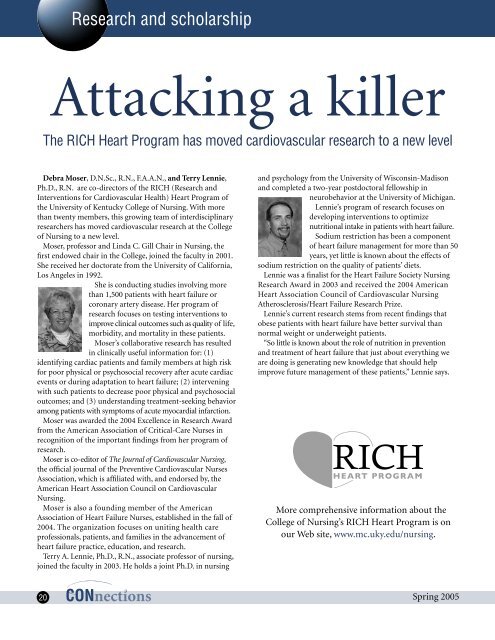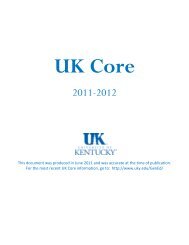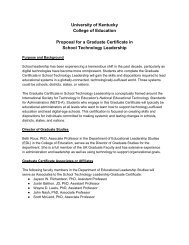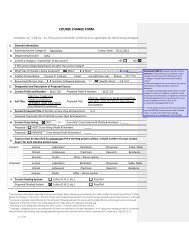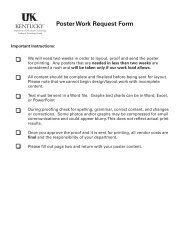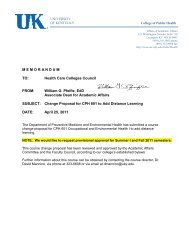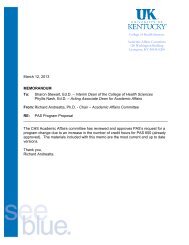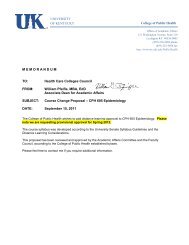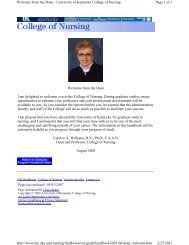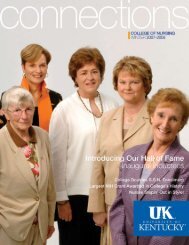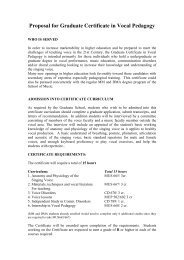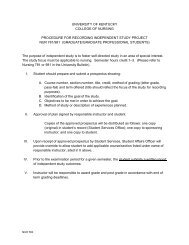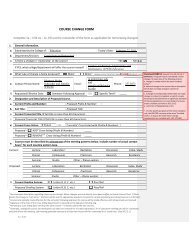Research and scholarshipAttacking a killerThe RICH Heart Program has moved cardiovascular research to a new levelDebra Moser, D.N.Sc., R.N., F.A.A.N., and Terry Lennie,Ph.D., R.N. are co-directors <strong>of</strong> the RICH (Research andInterventions for Cardiovascular Health) Heart Program <strong>of</strong>the <strong>University</strong> <strong>of</strong> <strong>Kentucky</strong> College <strong>of</strong> Nursing. With morethan twenty members, this growing team <strong>of</strong> interdisciplinaryresearchers has moved cardiovascular research at the College<strong>of</strong> Nursing to a new level.Moser, pr<strong>of</strong>essor and Linda C. Gill Chair in Nursing, thefirst endowed chair in the College, joined the faculty in 2001.She received her doctorate from the <strong>University</strong> <strong>of</strong> California,Los Angeles in 1992.She is conducting studies involving morethan 1,500 patients with heart failure orcoronary artery disease. Her program <strong>of</strong>research focuses on testing interventions toimprove clinical outcomes such as quality <strong>of</strong> life,morbidity, and mortality in these patients.Moser’s collaborative research has resultedin clinically useful information for: (1)identifying cardiac patients and family members at high riskfor poor physical or psychosocial recovery after acute cardiacevents or during adaptation to heart failure; (2) interveningwith such patients to decrease poor physical and psychosocialoutcomes; and (3) understanding treatment-seeking behavioramong patients with symptoms <strong>of</strong> acute myocardial infarction.Moser was awarded the 2004 Excellence in Research Awardfrom the American Association <strong>of</strong> Critical-Care Nurses inrecognition <strong>of</strong> the important findings from her program <strong>of</strong>research.Moser is co-editor <strong>of</strong> The Journal <strong>of</strong> Cardiovascular Nursing,the <strong>of</strong>ficial journal <strong>of</strong> the Preventive Cardiovascular NursesAssociation, which is affiliated with, and endorsed by, theAmerican Heart Association Council on CardiovascularNursing.Moser is also a founding member <strong>of</strong> the AmericanAssociation <strong>of</strong> Heart Failure Nurses, established in the fall <strong>of</strong>2004. The organization focuses on uniting health carepr<strong>of</strong>essionals, patients, and families in the advancement <strong>of</strong>heart failure practice, education, and research.Terry A. Lennie, Ph.D., R.N., associate pr<strong>of</strong>essor <strong>of</strong> nursing,joined the faculty in 2003. He holds a joint Ph.D. in nursingand psychology from the <strong>University</strong> <strong>of</strong> Wisconsin-Madisonand completed a two-year postdoctoral fellowship inneurobehavior at the <strong>University</strong> <strong>of</strong> Michigan.Lennie’s program <strong>of</strong> research focuses ondeveloping interventions to optimizenutritional intake in patients with heart failure.Sodium restriction has been a component<strong>of</strong> heart failure management for more than 50years, yet little is known about the effects <strong>of</strong>sodium restriction on the quality <strong>of</strong> patients’ diets.Lennie was a finalist for the Heart Failure Society NursingResearch Award in 2003 and received the 2004 AmericanHeart Association Council <strong>of</strong> Cardiovascular NursingAtherosclerosis/Heart Failure Research Prize.Lennie’s current research stems from recent findings thatobese patients with heart failure have better survival thannormal weight or underweight patients.“So little is known about the role <strong>of</strong> nutrition in preventionand treatment <strong>of</strong> heart failure that just about everything weare doing is generating new knowledge that should helpimprove future management <strong>of</strong> these patients,” Lennie says.More comprehensive information about theCollege <strong>of</strong> Nursing’s RICH Heart Program is onour Web site, www.mc.uky.edu/nursing.a20<strong>CONnections</strong> Spring 2005
New Center for Nursing ResearchThe new College <strong>of</strong> Nursing Center for Nursing Research is located on the fifth floor <strong>of</strong> the College. This 2,600 square foot spacecontains a reception area, two intervention suites, and cubicle/<strong>of</strong>fice space for our numerous research projects. Three full-timeproject staff, a postdoctoral fellow, and about 25 research assistants and research interns are housed in this area.About half <strong>of</strong> this space was renovated by the College in spring 2004. The remainder will undergo renovation this spring withfunding from the Executive Vice President for Research, Wendy Baldwin. Several more intervention suites and <strong>of</strong>fices will beadded as well as a group intervention room.Funding will cover the renovation only; thus, we are searching for funding to support the purchase <strong>of</strong> computers, furniture, andfile cabinets to furnish that space.This space will support our continued growth in extramural funding for research which was $1.4 million in 2004.Books and chaptersAnderson, D. G., & Allen, Kacy (2005). Families and publichealth nursing. In Hanson, S. M., Family health care nursing:Theory, practice and research, 3rd ed., Philadelphia: FA Davis.Lowry, R. C. (2005, in press). Holistic health strategies. InC. L. Edelman & C. L. Mandle, Health promotion throughoutthe lifespan, 5th ed., St. Louis: Mosby.Peden, A.R. (2004). Hildegarde Peplau. In Parker, Marilyn(Ed.). Nursing Theories and Nursing Practice, 2nd ed.,Philadelphia: F.A. Davis.Prevost, S. (in press). Defining evidence-based best practices.In Huston, C. (ed.) Pr<strong>of</strong>essional Issues in Nursing: Challengesand Opportunities, Philadelphia: Lippincott Williams &Wilkins.Sebastian, J.G., Stanhope, M., Williams, C.A., Pilon, B.,Richardson, H. & Williams, M.D. (2004). Academic nursingpractice models and related strategic issues. Evans, L.K. &Lang, N.M. (eds.) Academic Nursing Practice: Helping to Shapethe Future <strong>of</strong> Healthcare, New York: Springer Publishing Co., pp.38-65.Sebastian, J. G. (2004). Community health nurse managerand consultant. Stanhope, M. and Lancaster, J., CommunityHealth Nursing: Process and Practice for Promoting Health,6th ed., St. Louis: C.V. MosbyResearch grant newsDebra Moser is principal investigator on a study funded byNIH/NINR titled, “Biobehavioral Intervention in Heart Failure.”Ann Peden and Mary Kay Rayens are co-investigators onthe five-year, $1.6 million project, which will determine theimpact <strong>of</strong> bi<strong>of</strong>eedback-relaxation training on various heartfailure outcomes.Debra Moser is co-investigator on a $2 million, multi-sitestudy funded by the National Institute <strong>of</strong> Nursing Researchtitled, “Predicting CHD Events in Black and White Women.”The purpose is to conduct a longitudinal observationalPublications and presentationsOur faculty spent a busy year publishing and presenting.Recent publications and presentations can be foundon the College’s Web site at www.mc.uky.edu/nursing/news.study to determine if the McSweeney Acute and ProdoromalMyocardial Infarction Symptom Survey willdifferentiate prospectively between women who will and willnot experience a CHD event in a two-year period. JeanMcSweeney <strong>of</strong> the <strong>University</strong> <strong>of</strong> Arkansas for MedicalSciences is the Principal Investigator.Ellen Hahn and co-investigators Debra Moser, PatriciaBurkhart, and Mary Kay Rayens, received a 2003 ClinicalInnovator Award in the amount <strong>of</strong> $216,562 from the FlightAttendant Medical Research Institute for their study, “ReducingSecondhand Tobacco Smoke: Cardiac and Asthma Outcomes.”The objective <strong>of</strong> this research is to assess the relationshipbetween reduction in exposure to secondhand tobacco smokeat the community level and health care outcomes associatedwith acute coronary syndromes and asthma.Ellen Hahn was awarded a two-year, $241,790 grant fromthe Robert Wood Johnson Foundation for her study, “Smoke-Free Laws and Employee Turnover.” Mary Kay Rayens is aco-investigator. Other co-investigators are from the UKCenter for Business and Economic Research and theDepartment <strong>of</strong> Economics. The purpose <strong>of</strong> the study is toexamine the effects <strong>of</strong> smoke-free laws on employee turnoverand training costs in one large national restaurant chain.Mary Kay Rayens is a co-investigator on a grant fundedby the <strong>Kentucky</strong> Lung Cancer Research Program titled,“Breaking the Cycle: Smoking Intervention with Youth inFamilies Dealing with Lung Cancer.” Catherine Martin(Psychiatry) is principal investigator for the three-year,$290,628 study. The purpose <strong>of</strong> the project is to test theContinued on page 22www.mc.uky.edu/nursing <strong>University</strong> <strong>of</strong> <strong>Kentucky</strong> College <strong>of</strong> Nursing 21


